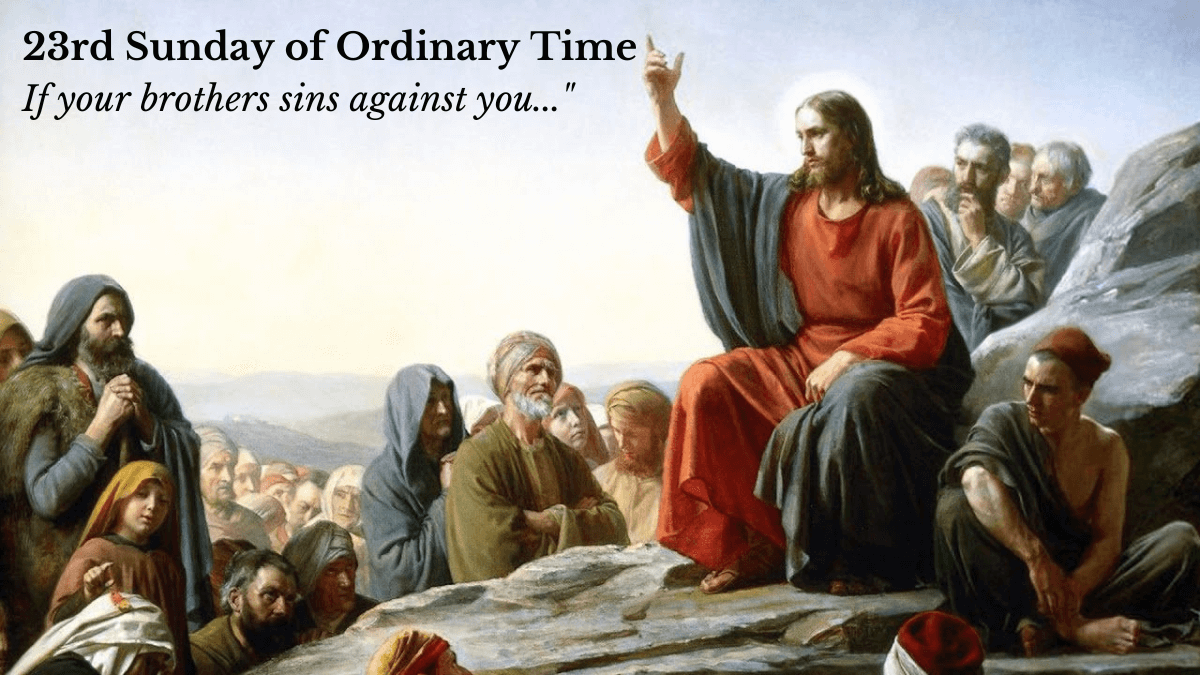On the Back Porch

23rd Sunday of Ordinary Time, Year A

What We Celebrate
“If your brother sins, go and tell him his fault between you and him alone.” (Mt 18:15) Let’s be honest…how often do we do this? Matthew Long offers that we are inclined to ‘forgive’ sins in advance of repentance rather than have to confront the guilty parties. The cartoonist at agnusday.org captures one of any number of reasons we don’t often carry out this gospel mandate.

It is not easy stuff. It involves preparation, a possible hard conversation, presenting your observations in such a way that true listening is made possible so that you “win” your brother or sister back to the path of righteousness. There is a whole lot more. It is a rich and robust gospel. Come and take a moment on the back porch!
Full Text of the Sunday Readings
Detailed Commentary on the Gospel
Image credit: Sermon on the Mount (1877) by Carl Heinrich Bloch, Museum of National History at Frederiksborg Castle, Public Domain
Sin
Sin is an interesting word. The oldest and first word used to describe sin is khata’. It means to fail or to miss the mark, miss the goal. In Judges 20:16, we learn that a slingshot expert who successfully nails the bullseye does not khata’, which means he did not fail, he didn’t miss the target. Similarly, we read in Proverbs 19:2 that people who act hastily while traveling are likely to khata’—to miss their intended destination, to end up lost, and perhaps in danger.
So, if sin is failing, missing the mark, or missing a goal, what’s the goal?
When God created humanity in his divine image, He set the goal. Genesis 1:26 captures the moment: “Let us make human beings in our image, after our likeness.” We are reminded that God exists in three undivided persons—Father, Son, and Holy Spirit—inseparable but distinct, forever together in an unbreakable bond of love. To be created in the image of a God means that our most essential nature is divine love. And as such we are to live with love for God and one another and all creation. That is the mark, that is our goal. Choosing to not love is to fail, to miss the goal. Choosing not to love is the most intrinsic instance of khata’ – sin.
Adam and Eve missed the goal of loving God when they ignore his instruction and redefine good and bad on their own terms. Their choice fractures their relationship with God and each other, leading to death. Turn the page and quickly see the corruption that comes from khata’ – in fact we encounter the Bible’s first use of khata’. Cain is faced with the decision to be truly human and love his brother or to corrupt himself and others by murdering his brother Abel. God warns Cain: “If you do not choose what is good, khata’ (sin) lies in wait at the door: its urge is for you, yet you can rule over it.” (Gen. 4:7). Sin is described as something outside of Cain, like a crouching predator waiting to attack and destroy life. But Cain can resist sin if he chooses to—he can rule over the crouching beast. So can we. Every person can reject sin by choosing to aim for the truest human goal—becoming infinitely loving toward God and others. To be perfect, whole, complete as is our heavenly Father.